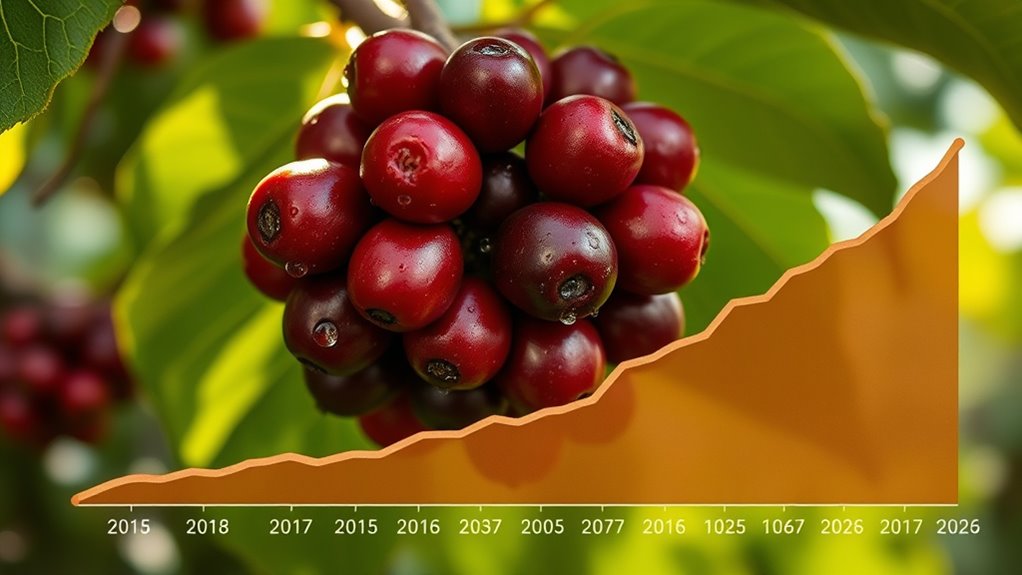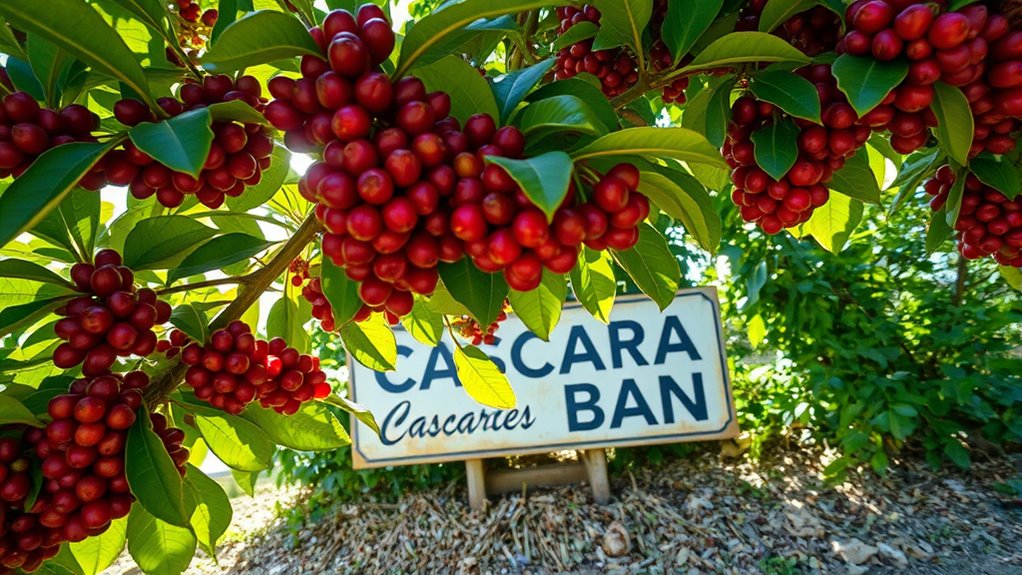Cascara’s ban is mainly due to safety concerns and strict FDA rules. It’s labeled as an over-the-counter laxative, but there just aren’t enough safety studies to back it up. High doses can lead to nasty side effects like liver issues and stomach cramps. Plus, those mycotoxins lurking around can be a real bummer for your health. If you’re curious about the twists and turns in the cascara saga, there’s definitely more to uncover!
At a Glance
- Cascara is classified by the FDA as an over-the-counter stimulant laxative, lacking sufficient safety studies for general recognition as safe and effective.
- High doses or prolonged use of cascara can lead to serious health issues, including liver toxicity and gastrointestinal problems.
- Regulatory hurdles prevent manufacturers from making health claims about cascara without FDA approval, limiting its market presence.
- Supply chain challenges and contamination risks from mycotoxins further complicate the safe consumption of cascara, especially for vulnerable populations.
- The lengthy regulatory approval process for cascara contributes to its restricted market access and consumer awareness.
Regulatory Classification of Cascara

When you think about cascara, you might picture a fancy drink at your favorite café, but there’s a whole regulatory saga behind it!
In the U.S., the FDA classifies cascara as an over-the-counter stimulant laxative, but don’t get too excited. It’s not considered generally recognized as safe and effective, thanks to some insufficient safety studies.
This means manufacturers can’t make health claims without FDA approval. Plus, they’ve to follow strict dosing limits to keep things safe. Interestingly, this situation mirrors the challenges faced by some coffee products, particularly those emphasizing ethical sourcing and quality to gain consumer trust.
Safety Concerns Surrounding Consumption
While you might think of cascara as just another trendy drink, its safety concerns should definitely have you raising an eyebrow. Cascara toxicity isn’t a joke, especially when it comes to your liver health. It can lead to some serious issues if consumed in high doses or for too long. Additionally, many people are turning to low acid coffee as a gentler alternative for their daily caffeine fix, which may pose fewer risks to health.
| Concern | Risks | Sensitive Groups |
|---|---|---|
| Liver Damage | Hepatotoxicity | Pregnant Women |
| Gastrointestinal Issues | Stomach cramps, diarrhea | Children |
| Electrolyte Imbalance | Potassium depletion | Breastfeeding Women |
| Contamination Risks | Mycotoxins and fungi | Vulnerable Populations |
Historical Consumption Data and Its Impact

Cascara’s journey from a coffee by-product to a trendy health drink has been quite the ride, hasn’t it?
The historical consumption data reveals just how far cascara’s come, shaping consumer trends along the way:
- The global market for cascara hit about USD 227.53 million in 2022.
- North Americans are major fans, splurging on cascara products.
- Demand for natural ingredients is skyrocketing, pushing this market forward.
- By 2034, it could reach a whopping USD 1.59 billion!
With these trends, cascara’s not just a drink; it’s become a lifestyle choice, connecting people to healthier, natural options. Additionally, the rich flavors of ground coffee highlight the diverse ways consumers explore coffee-related products.
How cool is that?
The Regulatory Approval Process
Steering through the regulatory approval process for cascara can feel a bit like trying to solve a puzzle with missing pieces. You’ll face submission challenges, especially with the approval timeline stretching over years. But hang tight! Here’s a quick look at the key steps:
| Step | Description | Time Frame |
|---|---|---|
| Application Submission | Submit via the European Commission’s portal | Varies |
| Data Requests | Respond to info requests from authorities | May take months |
| Safety Evaluation | EFSA assesses safety and compliance | Can take years |
| Final Approval | Receive authorization for market entry | Depends on data |
Getting cascara approved isn’t a walk in the park, but it’s essential for your safety! Additionally, it’s crucial to ensure that the product meets safety and compliance standards established by regulatory bodies.
Market Impact of the Ban

Steering through the world of cascara can be a bit wild, especially with the recent ban shaking things up.
This ban has left its mark on market trends and consumer preferences, creating a unique situation. Here’s what you need to know:
- Regulatory hurdles limit cascara’s presence.
- Supply chain issues are causing production headaches.
- Awareness about cascara’s benefits is lacking.
- Some regions still embrace cascara, causing market disparities.
With all this chaos, smaller shops and farmers feel the pinch more than big guys. Additionally, the rise of eco-friendly coffee options may influence consumer choices moving forward.
It’s a rollercoaster ride, but who knows? The future might still be bright for our beloved cascara!
Health and Safety Considerations
When diving into the world of cascara, it’s hard not to bump into some health and safety concerns that can make you raise an eyebrow. Sure, cascara benefits might sound appealing, but public perception isn’t always so rosy.
| Concern | Detail |
|---|---|
| Potential Toxicity | Linked to gastrointestinal issues |
| Microbiological Risks | Prone to bacterial contamination if mishandled |
| Regulatory Scrutiny | Classified as a “novel food” in the EU |
| Limited Safety Data | Few studies on long-term effects |
Additionally, low acid organic coffee is often recommended for those concerned about gastrointestinal issues associated with high-acid beverages.





